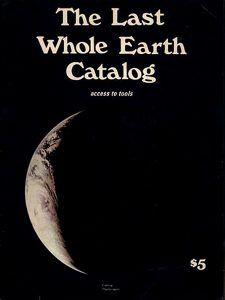 Time to resurrect another suddenly relevant item we first mentioned back in 2009…
Time to resurrect another suddenly relevant item we first mentioned back in 2009…
Between 1968 and 1972, Stewart Brand published The Whole Earth Catalog. For Kevin Kelly, the Catalog was essentially “a paper-based database offering thousands of hacks, tips, tools, suggestions, and possibilities for optimizing your life.” For Steve Jobs, it was a “Bible” of his generation, a life ‑transforming publication. Speaking to Stanford graduates in 2005, in what Ken Auletta has called the “Gettysburg Address of graduation-speechism,” Jobs explained why he drew inspiration from this intellectual creation of the 60s counterculture:
When I was young, there was an amazing publication called The Whole Earth Catalog, which was one of the bibles of my generation. It was created by a fellow named Stewart Brand not far from here in Menlo Park, and he brought it to life with his poetic touch. This was in the late 1960’s, before personal computers and desktop publishing, so it was all made with typewriters, scissors, and polaroid cameras. It was sort of like Google in paperback form, 35 years before Google came along: it was idealistic, and overflowing with neat tools and great notions.
Stewart and his team put out several issues of The Whole Earth Catalog, and then when it had run its course, they put out a final issue. It was the mid-1970s, and I was your age. On the back cover of their final issue was a photograph of an early morning country road, the kind you might find yourself hitchhiking on if you were so adventurous. Beneath it were the words: “Stay Hungry. Stay Foolish.” It was their farewell message as they signed off. Stay Hungry. Stay Foolish. And I have always wished that for myself. And now, as you graduate to begin anew, I wish that for you.
The good news is that The Whole Earth Catalog and some related publications are available online. You can read them for free, or download them for a fee. We suggest diving in right here, in Fall 1968, where it all begins. Enjoy.…
Note: If you’re having problems find your way around the site, check out the Twitter stream for the The Whole Earth Catalogue. It includes links to various online editions. We’ve also added the text to our collection of Free eBooks.

